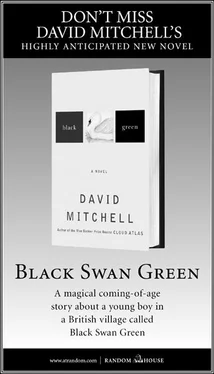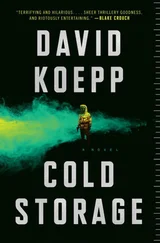David Mitchell - Cloud Atlas
Здесь есть возможность читать онлайн «David Mitchell - Cloud Atlas» весь текст электронной книги совершенно бесплатно (целиком полную версию без сокращений). В некоторых случаях можно слушать аудио, скачать через торрент в формате fb2 и присутствует краткое содержание. Жанр: Старинная литература, на английском языке. Описание произведения, (предисловие) а так же отзывы посетителей доступны на портале библиотеки ЛибКат.
- Название:Cloud Atlas
- Автор:
- Жанр:
- Год:неизвестен
- ISBN:нет данных
- Рейтинг книги:5 / 5. Голосов: 1
-
Избранное:Добавить в избранное
- Отзывы:
-
Ваша оценка:
- 100
- 1
- 2
- 3
- 4
- 5
Cloud Atlas: краткое содержание, описание и аннотация
Предлагаем к чтению аннотацию, описание, краткое содержание или предисловие (зависит от того, что написал сам автор книги «Cloud Atlas»). Если вы не нашли необходимую информацию о книге — напишите в комментариях, мы постараемся отыскать её.
Cloud Atlas — читать онлайн бесплатно полную книгу (весь текст) целиком
Ниже представлен текст книги, разбитый по страницам. Система сохранения места последней прочитанной страницы, позволяет с удобством читать онлайн бесплатно книгу «Cloud Atlas», без необходимости каждый раз заново искать на чём Вы остановились. Поставьте закладку, и сможете в любой момент перейти на страницу, на которой закончили чтение.
Интервал:
Закладка:
Henry recited from Psalm the Eighth, in a voice as sonorous as any schooled dramatist: “Thou madest him to have dominion over the works of thy hands; thou has put all things under his feet: all sheep & oxen, yea & the beasts of the field; the fowl of the air & the fish of the sea & whatsoever passeth through the paths of the seas.”
No organist played a Magnificat but the wind in the flue chimney, no choir sang a Nunc Dimittis but the wuthering gulls, yet I fancy the Creator was not displeazed. We resembled more the Early Christians of Rome than any later Church encrusted with arcana & gem-stones. Communal prayer followed. Parishioners prayed ad lib for the eradication of potato blight, mercy on a dead infant’s soul, blessing upon a new fishing boat, &c. Henry gave thanks for the hospitality shown us visitors by the Christians of Chatham Isle. I echoed these sentiments & sent a prayer for Tilda, Jackson & my father-in-law during my extended absence.
After the service, the doctor & I were approached most cordially by an elder “mainmast” of that chapel, one Mr. Evans, who introduced Henry & me to his good wife (both circumvented the handicap of deafness by answering only those questions they believed had been asked & accepting only those answers they believed had been uttered—a stratagem embraced by many an American advocate) & their twin sons, Keegan & Dyfedd. Mr. Evans made it known that every week he had the custom of inviting Mr. D’Arnoq, our Preacher, to dine at their nearby home, for the latter dwells in Port Hutt, a promontory some miles distant. Would we, too, join their Sabbath Meal? Having already informed Henry of that Gomorrah back at the Musket & hearing cries of “Mutiny!” from our stomachs, we accepted the Evanses’ kindness with gratitude.
Ourrythin’ farmstead, seated half a mile from Ocean Bay up a winding, blustery valley, proved to be a frugal building, but proof against those hell-bent storms that break the bones of so many hapless vessels upon nearby reefs. The parlor was inhabited by a monstrous hog’s head (afflicted with droop-jaw & lazy-eye), killed by the twins on their sixteenth birthday, & a somnambulant Grandfather clock (at odds with my own pocket watch by a margin of hours. Indeed, one valued import from New Zealand is the accurate time). An Indian farmhand peered through the windowpane at his master’s visitors. No more tatterdemalion a renegado I ever beheld, but Mr. Evans swore the quadroon, Barnabas, was “the fleetest sheepdog who ever ran upon two legs.” Keegan & Dyfedd are honest woolly fellows, versed principally in the ways of sheep (the family own two hundred head), for neither has gone to “Town” (the islanders thus appellate New Zealand) nor undergone any schooling save Scripture lessons from their father, by dint of which they have learnt to read & write tolerably well.
Mrs. Evans said grace & I enjoyed my most pleasant repast (untainted by salt, maggots & oaths) since my farewell dinner with Consul Bax & the Partridges at the Beaumont. Mr. D’Arnoq told us tales of ships he has supplied during his ten-year on Chatham Isle, while Henry amused us with stories of patients, both illustrious & humble, he has benefacted in London & Polynesia. For my part I described the many hardships overcome by this American notary in order to locate the Australian beneficiary of a will executed in California. We washed down our mutton stew & apple dumpling with small ale brewed by Mr. Evans for trading with whalers. Keegan & Dyfedd left to attend to their livestock & Mrs. Evans retired to her kitchen duties. Henry asked if missionaries were now active on the Chathams, at which Mr. Evans & Mr. D’Arnoq exchanged looks & the former informed us, “Nay, the Maori don’t take kindly to us Pakeha spoiling their Moriori with too much civilization.”
I questioned if such an ill as “too much civilization” existed or no? Mr. D’Arnoq told me, “If there is no God west of the Horn, why there’s none of your constitution’s All men created equal , neither, Mr. Ewing.” The nomenclatures Maori & Pakeha I knew from the Prophetess’s sojourn at the Bay of Islands, but I begged to know who or what Moriori might signify. My query unlocked a Pandora’s Box of history, detailing the decline & fall of the Aboriginals of Chatham. We lit our pipes. Mr. D’Arnoq’s narrative was unbroken three hours later when he had to depart for Port Hutt ere nightfall obscured the dykey way. His spoken history, for my money, holds company with the pen of a Defoe or Melville & I shall record it in these pages, after, Morpheus willing, a sound sleep.
Monday, 11th November
—
Dawn sticky & sunless. The Bay has a slimy appearance, but the weather is mild enough to allow repairs to continue on the Prophetess , I thank Neptune. A new mizzen-top is being hoisted into position as I write.
A short time past, while Henry & I breakfasted, Mr. Evans arrived hugger-mugger, importuning my doctor friend to attend to a reclusive neighbor, one Widow Bryden, who was thrown from her horse on a stony bog. Mrs. Evans was in attendance and fears that the widow lies in peril of her life. Henry fetched his doctor’s case & left without delay. (I offered to come, but Mr. Evans begged my forbearance, as the patient had extracted a promise that none but a doctor should see her incapacitated.) Walker, overhearing these transactions, told me no member of the male sex had crossed the widow’s threshold these twenty years & decided that “the frigid old sow must be on her last trotters if she’s letting Dr. Quack frisk her.”
The origins of the Moriori of Rēkohu (the native moniker for the Chathams) remain a mystery to this day. Mr. Evans evinces the belief they are descended from Jews expelled from Spain, citing their hooked noses & sneering lips. Mr. D’Arnoq’s preferred theorum, that the Moriori were once Maori whose canoes were wrecked upon these remotest of isles, is founded on similarities of tongue & mythology & thereby possesses a higher carat of logic. What is certain is that, after centuries or millennia of living in isolation, the Moriori lived as primitive a life as their woebegone cousins of Van Diemen’s Land. Arts of boatbuilding (beyond crude woven rafts used to cross the channels betwixt islands) & navigation fell into disuse. That the terraqueous globe held other lands, trod by other feet, the Moriori dreamt not. Indeed, their language lacks a word for “race” & “Moriori” means, simply, “People.” Husbandry was not practiced, for no mammals walked these isles until passing whalers willfully marooned pigs here to propagate a parlor. In their virgin state, the Moriori were foragers, picking up paua shellfish, diving for crayfish, plundering bird eggs, spearing seals, gathering kelp & digging for grubs & roots.
Thus far, the Moriori were but a local variant of most flaxen-skirted, feather-cloaked heathens of those dwindling “blind spots” of the ocean still unschooled by the White Man. Old Rēkohu’s claim to singularity, however, lay in its unique pacific creed. Since time immemorial, the Moriori’s priestly caste dictated that whosoever spilt a man’s blood killed his own mana —his honor, his worth, his standing & his soul. No Moriori would shelter, feed, converse with, or even see the persona non grata. If the ostracized murderer survived his first winter, the desperation of solitude usually drove him to a blowhole on Cape Young, where he took his life.
Consider this, Mr. D’Arnoq urged us. Two thousand savages (Mr. Evans’s best guess) enshrine “Thou Shalt Not Kill” in word & in deed & frame an oral “Magna Carta” to create a harmony unknown elsewhere for the sixty centuries since Adam tasted the fruit of the Tree of Knowledge. War was as alien a concept to the Moriori as the telescope is to the Pygmy. Peace , not a hiatus betwixt wars but millennia of imperishable peace, rules these far-flung islands. Who can deny Old Rēkohu lay closer to More’s Utopia than our States of Progress governed by war-hungry princelings in Versailles & Vienna, Washington & Westminster? “Here,” declaimed Mr. D’Arnoq, “and here only, were those elusive phantasms, the noble savages, framed in flesh & blood!” (Henry, as we later made our way back to the Musket , confessed, “I could never describe a race of savages too backwards to throw a spear straight as ‘noble.’ ”)
Читать дальшеИнтервал:
Закладка:
Похожие книги на «Cloud Atlas»
Представляем Вашему вниманию похожие книги на «Cloud Atlas» списком для выбора. Мы отобрали схожую по названию и смыслу литературу в надежде предоставить читателям больше вариантов отыскать новые, интересные, ещё непрочитанные произведения.
Обсуждение, отзывы о книге «Cloud Atlas» и просто собственные мнения читателей. Оставьте ваши комментарии, напишите, что Вы думаете о произведении, его смысле или главных героях. Укажите что конкретно понравилось, а что нет, и почему Вы так считаете.












